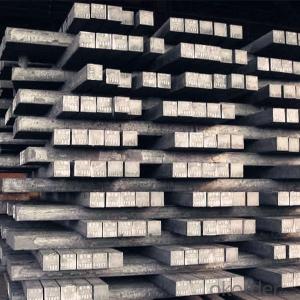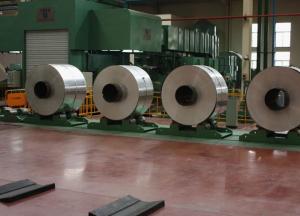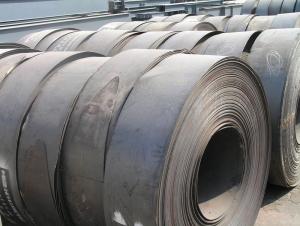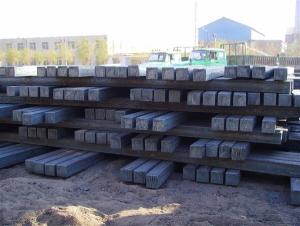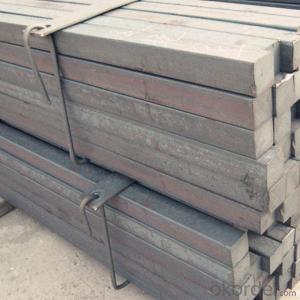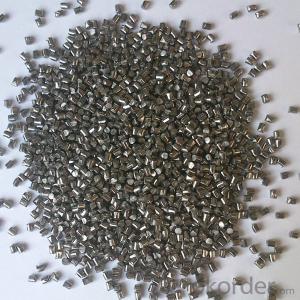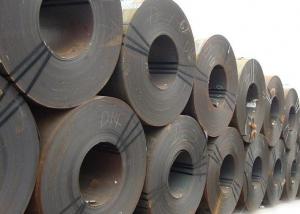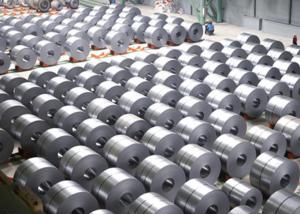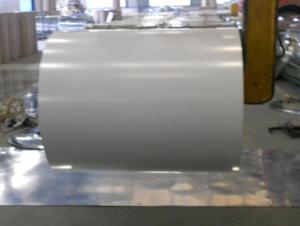Gbq195, Q235, Q275, JIS Ss400, 3sp, 4sp Steel Billets
- Loading Port:
- China main port
- Payment Terms:
- TT OR LC
- Min Order Qty:
- 20 m.t.
- Supply Capability:
- 50000 m.t./month
OKorder Service Pledge
OKorder Financial Service
You Might Also Like
Item specifice
Product Description
1.Executive Standard:GB,ASTM,DIN,JIS,BS
2.Product:Q195,Q235,Q275,SS400,S185,S235JR Steel Billets
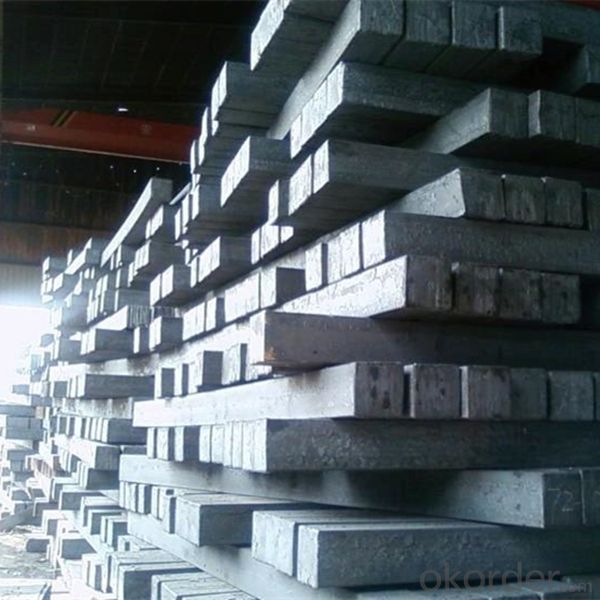
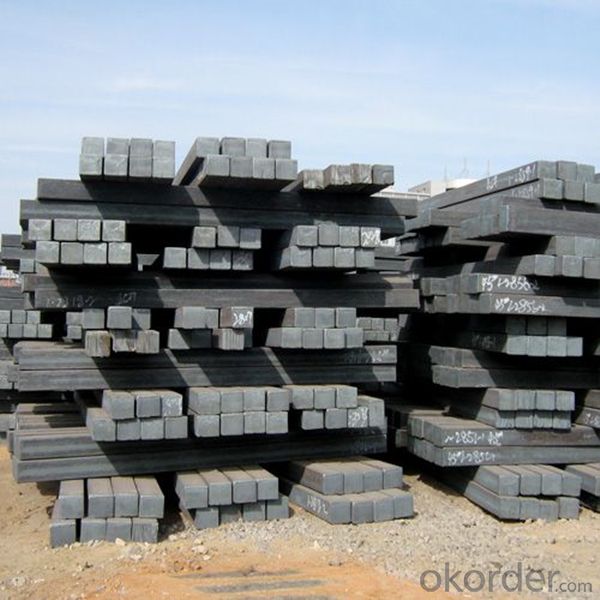
3.Process: Hot rolled
4.Application:These products are widely used in all kinds of architecture and engineering structure, such as the beam, Bridges, transmission tower, hoisting, ship,industrial furnace, container frame and warehouse and Other fields.
5.Surface Condition: Black or as required
6.MOQ:1000MT
7.Chemical Composition:
| Standard | C(%) | Mn(%) | S(%) | P(%) | Si(%) |
| Q195 | ≤0.12 | ≤0.50 | ≤0.040 | ≤0.035 | ≤0.30 |
| Q235 | ≤0.20 | ≤1.40 | ≤0.045 | ≤0.045 | ≤0.35 |
| Q275 | ≤0.22 | ≤1.50 | ≤0.045 | ≤0.045 | ≤0.35 |
| 20MnSi | 0.17-0.25 | 1.2-1.6 | ≤ 0.050 | ≤ 0.050 | 0.40-0.80 |
| 3SP | 0.14-0.22 | 0.40-0.85 | ≤ 0.050 | ≤ 0.040 | 0.05-0.15 |
| 5SP | 0.28-0.37 | 0.50-1.00 | ≤ 0.050 | ≤ 0.040 | 0.15-0.30 |
8. FAQ
1. Q: Where is your company located? How can I visit there?
A: Our company is located in Beijing, China. Welcome to visit us.
2. Q: Can I get sample and how long will it take?
A:Yes. We can supply sample. And you need to pay for courier.
3. Q: What's the MOQ?
A: Our MOQ is 25mt.
4. Q: What's the delivery time?
A: It will take about 30 days after TT or L/C.
5. Q: What is the payment terms?
A: T/T, L/C at sight
6. Q: How does your factory carry out quality control?
A: We attach great importance to quality control.Every part of our products has its own QC.
7. Q: What certificate do you have?
A: We have SGS, ISO9001 etc. Also we can apply any certificate if you need if the qty is OK.
- Q:How are steel products used in the water treatment industry?
- Steel products are commonly used in the water treatment industry for various purposes such as constructing water treatment plants, manufacturing storage tanks, and building pipelines and distribution systems. Steel's durability, strength, and corrosion resistance make it an ideal material for these applications, ensuring the safe and efficient treatment and distribution of clean water to communities.
- Q:How does steel pipe coating for natural gas pipelines work?
- Steel pipe coating for natural gas pipelines works by applying a protective layer on the surface of the pipe to prevent corrosion and ensure its longevity. This coating is usually made of fusion-bonded epoxy or other corrosion-resistant materials. The pipe is cleaned and preheated, and then the coating material is applied through a specialized process such as spraying or wrapping. Once the coating is applied, it is cured to form a strong bond with the pipe surface. This layer acts as a barrier against moisture, chemicals, and other elements, safeguarding the pipeline and maintaining the integrity of the natural gas transportation system.
- Q:How is steel plate cut and shaped?
- Steel plates can be cut and shaped using various methods such as thermal cutting (using oxy-fuel or plasma), mechanical cutting (shearing or sawing), or laser cutting. Once the initial cutting is done, the steel plate can be further shaped through processes like bending, rolling, or forming to achieve the desired dimensions and contours. These methods ensure precise and accurate cuts and shapes, allowing steel plates to be used in a wide range of applications.
- Q:How are steel products used in the manufacturing of appliances and consumer goods?
- Steel products are widely used in the manufacturing of appliances and consumer goods due to their durability, strength, and versatility. Steel is commonly used to make the frames, casings, and components of appliances like refrigerators, ovens, washing machines, and dishwashers. It provides the necessary stability and structural integrity to support and protect the internal components. Additionally, steel is used in consumer goods such as kitchenware, cutlery, and tools due to its resistance to corrosion and its ability to maintain a sharp edge. Overall, steel plays a crucial role in ensuring the quality and longevity of appliances and consumer goods.
- Q:What are the different types of steel reinforcing bars?
- The different types of steel reinforcing bars, commonly known as rebar, include deformed rebar, plain rebar, epoxy-coated rebar, and stainless steel rebar. Deformed rebar has ridges or deformations on its surface to provide better adhesion with concrete. Plain rebar, on the other hand, has a smooth surface but is not commonly used due to its limited bond strength. Epoxy-coated rebar is coated with epoxy to protect it from corrosion and is often used in areas with high moisture or salt exposure. Stainless steel rebar is highly resistant to corrosion and is typically used in environments with extreme conditions or where long-term durability is required.
- Q:How is steel pipe coated for corrosion resistance?
- Steel pipe can be coated for corrosion resistance through various methods such as galvanization, epoxy coating, or fusion-bonded epoxy coating. Galvanization involves applying a layer of zinc to the steel surface, forming a protective barrier against corrosion. Epoxy coating involves applying a layer of epoxy resin to the pipe surface, providing a durable barrier against corrosion. Fusion-bonded epoxy coating involves applying a powder coating to the heated pipe surface, which then melts and fuses to form a corrosion-resistant layer. These coating methods help protect steel pipes from the damaging effects of corrosion, extending their lifespan and maintaining their structural integrity.
- Q:How are steel products used in the chemical industry?
- Steel products are widely used in the chemical industry for various applications such as storage tanks, pipelines, reactors, and other equipment. The durability and resistance of steel make it suitable for handling corrosive and high-pressure substances. Additionally, steel's high melting point allows it to withstand extreme temperatures in chemical processes. Overall, steel products play a critical role in ensuring the safe and efficient handling of chemicals in the industry.
- Q:What are the common uses of steel in everyday life?
- Steel is widely used in everyday life for various purposes. It is commonly used in construction to create sturdy buildings, bridges, and infrastructure. Steel is also used in the manufacturing of vehicles, such as cars, trucks, and bicycles, providing strength and durability. It is utilized in household appliances like refrigerators, stoves, and washing machines due to its heat resistance and longevity. Steel is also found in cutlery, tools, and machinery. Overall, steel's versatility and reliability make it an essential material in numerous aspects of our daily lives.
- Q:How is steel used in the production of storage tanks and containers?
- Steel is commonly used in the production of storage tanks and containers due to its strength, durability, and corrosion resistance. It provides a reliable and secure option for storing various fluids and materials, including water, chemicals, and petroleum products. Additionally, steel can be easily molded and fabricated into different shapes and sizes, making it versatile for different storage requirements.
- Q:How is steel used in the production of marine equipment and vessels?
- Steel is widely used in the production of marine equipment and vessels due to its exceptional strength, durability, and corrosion resistance. It is used to construct the hulls, frames, and superstructures of ships, ensuring they can withstand the harsh marine environment. Additionally, steel is used to manufacture various components such as propellers, shafts, and rudders, enhancing the performance and maneuverability of marine vessels.
1. Manufacturer Overview |
|
|---|---|
| Location | |
| Year Established | |
| Annual Output Value | |
| Main Markets | |
| Company Certifications | |
2. Manufacturer Certificates |
|
|---|---|
| a) Certification Name | |
| Range | |
| Reference | |
| Validity Period | |
3. Manufacturer Capability |
|
|---|---|
| a)Trade Capacity | |
| Nearest Port | |
| Export Percentage | |
| No.of Employees in Trade Department | |
| Language Spoken: | |
| b)Factory Information | |
| Factory Size: | |
| No. of Production Lines | |
| Contract Manufacturing | |
| Product Price Range | |
Send your message to us
Gbq195, Q235, Q275, JIS Ss400, 3sp, 4sp Steel Billets
- Loading Port:
- China main port
- Payment Terms:
- TT OR LC
- Min Order Qty:
- 20 m.t.
- Supply Capability:
- 50000 m.t./month
OKorder Service Pledge
OKorder Financial Service
Similar products
New products
Hot products
Related keywords
